Jeju 4·3, U.N. and the United States
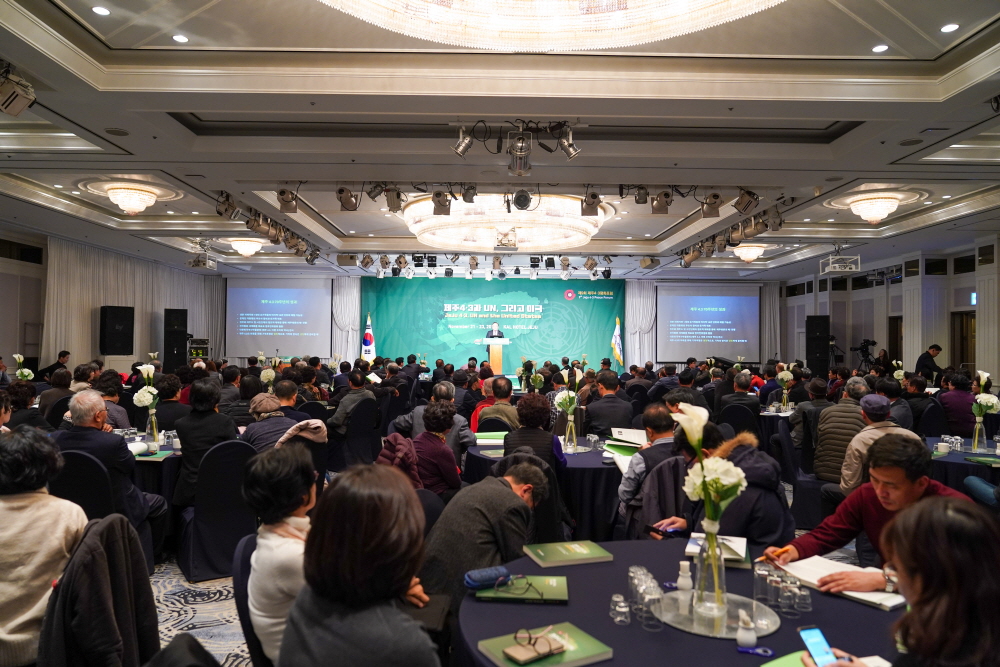 The 9th Jeju 4·3 Peace Forum
The 9th Jeju 4·3 Peace Forum
Edited by Ban Yeong-gwan, Jeju 4·3 Peace Foundation Research Team
The 9th Jeju 4·3 Peace Forum was held at Jeju KAL Hotel from Nov. 21 to 23, 2019, under the theme of “Jeju 4·3, U.N. and the United States.” Eight-teen experts in various fields from home and abroad delivered presentations and discussions regarding the relationship between Jeju 4·3, the United Nations and the United States as an extension of the 8th forum in 2018 and the international human rights symposium that took place at the U.N. headquarters earlier last year.
The Jeju 4·3 Peace Forum, which marked its 9th anniversary, began at 5 p.m. on Nov. 21 with a keynote speech by Joo Jin-oh, the director of the Korean Historical Museum.
“In the perspective of America, we should urge Congress and the press of the United States to make their government and civil society recognize Jeju 4·3 so they can deal with the issue of responsibility,” Director Joo said in his speech titled “Between Passion and Calm: the Future of Jeju 4·3”
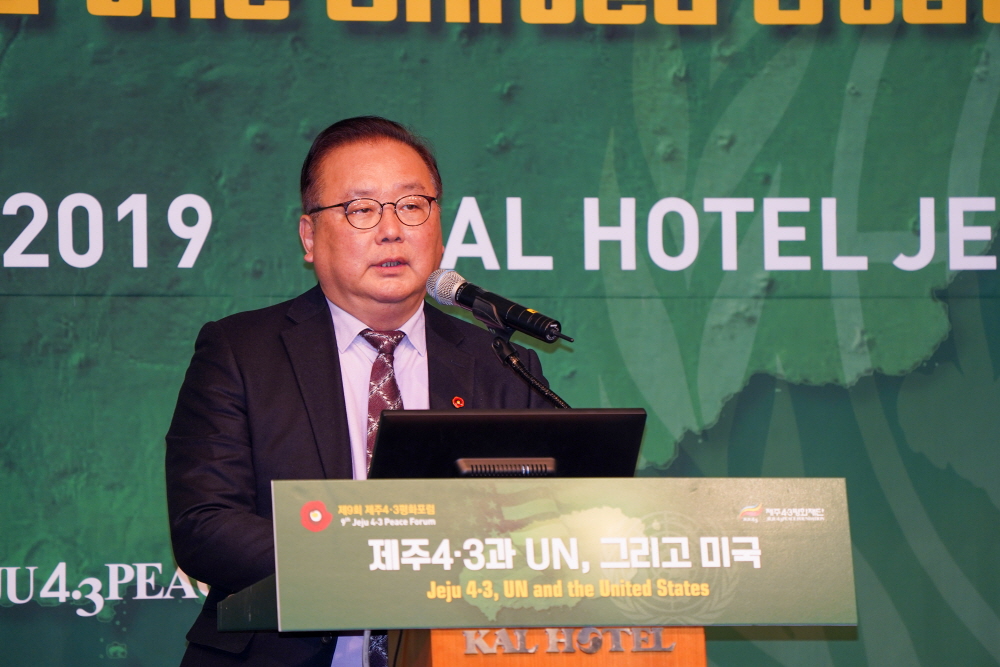
<Joo Jin-oh>
He also stressed the need to strengthen Jeju 4·3 history education to help not only Koreans but also those all around the world to better understand it correctly. It would also help globalize Jeju 4.3. and create close relationships between Korean overseas scholars, NGOs, universities and research institutes. He said that we have to train new scholars to inherit the spirit of the pain and reconciliation of Jeju 4·3 and provide real support to create more Jeju 4·3-themed cultural content.
Session 1, titled “U.N. and the World Order,” began on the second day of Nov. 22 at 10 a.m.
As Heo Eun, a professor at Korea University, served as Chair of the session, Park Heung-soon, an honorary professor at Sunmoon University, and Steven Lee, a professor at the University of British Columbia, assessed the role and function of the U.N.
During the session, Park and Lee explained the different realities of international politics with an example of the U.N.’s intervention in the division of Palestine, India, and Pakistan through their presentations “U.N. and the World Peace” and “Beyond Korean War: The United Nations, Partition and Civil Riots in Early Cold War,” respectively.
In the discussion, Cho Hyung-keun, a former professor at Hallym University, and Moon Yong-il, a professor at Kyungnam University, highlighted the logic of the powerful nations and their relationship with the U.N.
In session 1, the U.N. and international politics were introduced, and in session 2, “U.N., the United States and Jeju,” the panels discussed the roles and responsibilities of the U.N. and the United States in Jeju 4·3. Hong Seuk-ryule, a professor at Sungshin Women’s University, served as chair, and James Purson, a professor at Johns Hopkins University, and Kee Kwang-Seo, a professor at Chosun University, reviewed the clashes of powerful nations on the Korean Peninsula around Jeju 4·3 in their speeches titled “From Liberation to Partition: The United States, the Soviet Union and the Korean Peninsula” and “The Voting for Supreme People’s Assembly in 1948,” respectively.
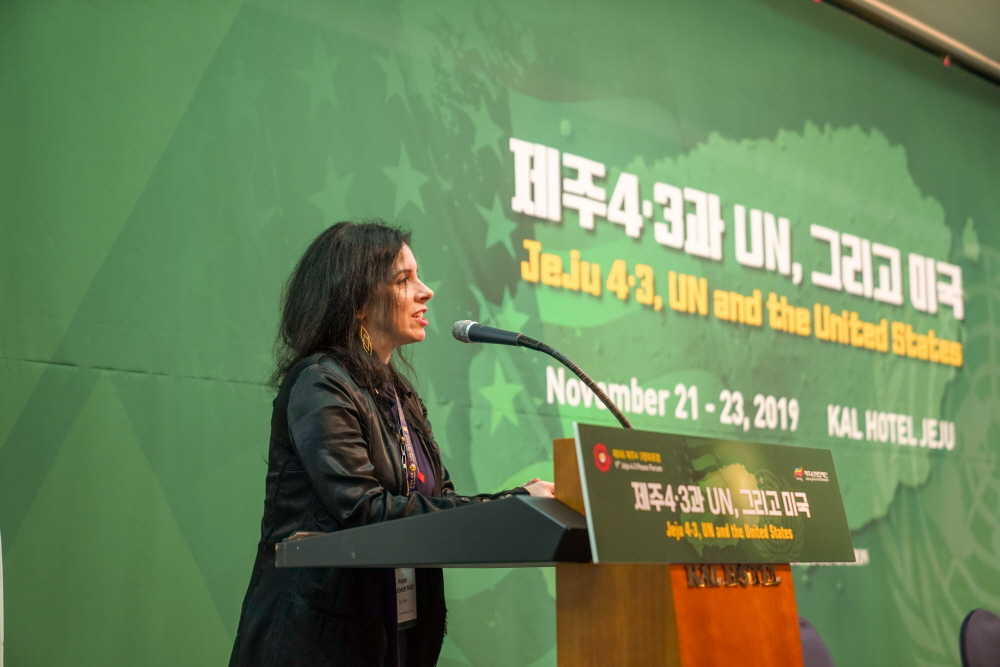
<Hope May>
Hope May, a professor at Central Michigan University, pointed out that the U.N. Temporary Commission on Korea on Jeju during the massacre reported the of existence a reasonable degree of freedom, though the commission witnessed considerable violence and torture by police in her speech titled “the U.N. Temporary Commission on Korea, the Ad Hoc Committee and Jeju 4·3.”
Park Myung-lim, a professor at Yonsei University, interpreted the symbolic meaning of the wounds that 4·3 left and healing through his presentation titled “U.N., the General Election and Jeju 4·3,” and mentioned efforts to globalize 4·3, including the Jeju 4·3 human rights symposium held at the U.N. headquarters in New York City in June of 2019, which was hosted by the Jeju 4·3 Peace Foundation.
“Though the beginning may be humble, may it be a step forward and significant,” he said.
Lee Shin-cheol, the director of the Asia Peace and History Institute, and Murakami Naoko, a researcher at Tsuda College, conducted the discussion of session 3, which was held at 5 p.m., during which Jeju citizens in the U.S. expressed their opinions.
Kang Jun-hwa, president of the May 18 Memorial Association in America, delivered his presentation about the development process of the May 18 commemoration project in the United States. Lee Hanjin, president of the Jejudo Association of America, and Yang Young-jun, a columnist from Washington, D.C, conducted a discussion about the formation of the 4·3 organization in the United States. Lee, who helped a lot at the U.N. Human Rights Symposium held in June 2019, promised to put forth efforts to make the 4·3 Truth Movement beyond Jeju toward the U.S. and the U.N. “The 4·3 Truth Movement in America is faced with challenges, but I will promote the movement hard and steadily,” Yang Young-jun said, receiving a round of applause from the audience.
The 9th Jeju 4·3 Peace Forum drew 500 people over the two days and showed how much interest the victims of Jeju 4·3, the bereaved families and Jeju residents had in the relationship between the U.N., the United States and Jeju 4·3. Both the speakers and panelists agreed that back then there was a complicated international situation involving the powerful nations and the Jeju locals were eager to establish a single government. They stressed that it is necessary to deal with the responsibilities of the United States and the U.N., and more evidence is needed and to further investigate in order to pursue compensation and to finally leave the dark cave and emerge into the light of truth as May quoted Plato. Meanwhile, Lee Han-jin and Yang Young-jun’s pledge and the enthusiastic support from the audiences was the achievement of the international movement for the truth and reconciliation of Jeju 4·3.
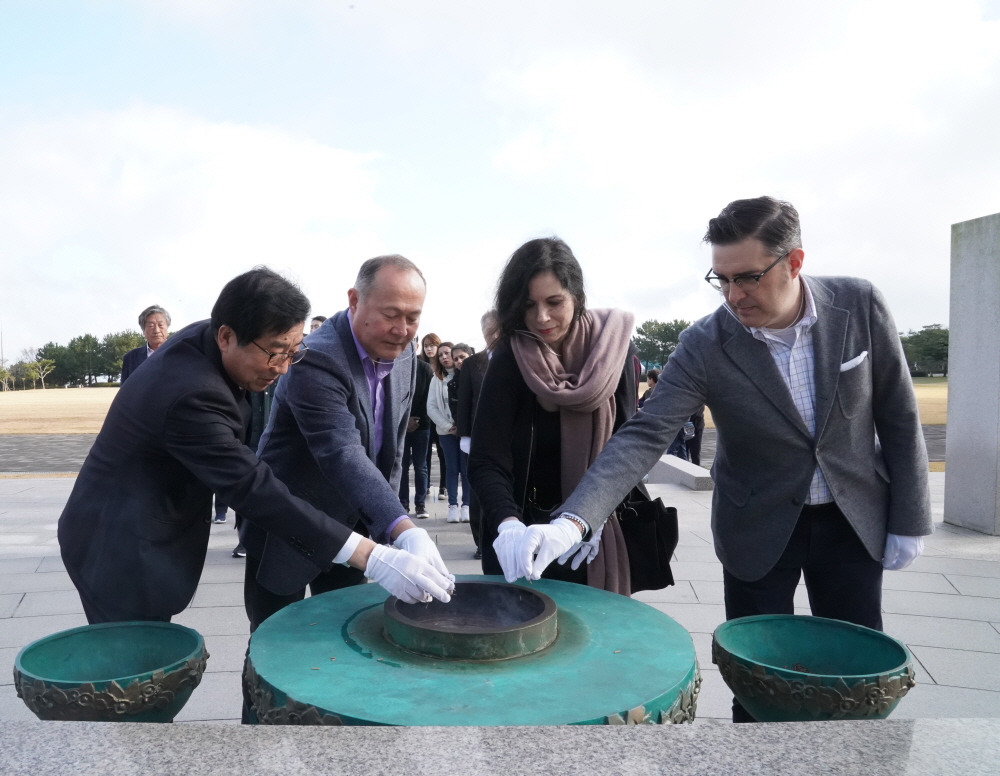 On the last day, Nov. 23, participants including Professor Steven Lee, Professor Hope May, and Professor James Purson visited the Jeju 4·3 Peace Park. The visitors toured the Memorial Service Altar, the Tombstone Park for the Missing and the Peace Memorial Hall under the guidance of the Chairperson Yang Jo-hoon and Research Director Yang Jung-sim.
On the last day, Nov. 23, participants including Professor Steven Lee, Professor Hope May, and Professor James Purson visited the Jeju 4·3 Peace Park. The visitors toured the Memorial Service Altar, the Tombstone Park for the Missing and the Peace Memorial Hall under the guidance of the Chairperson Yang Jo-hoon and Research Director Yang Jung-sim.
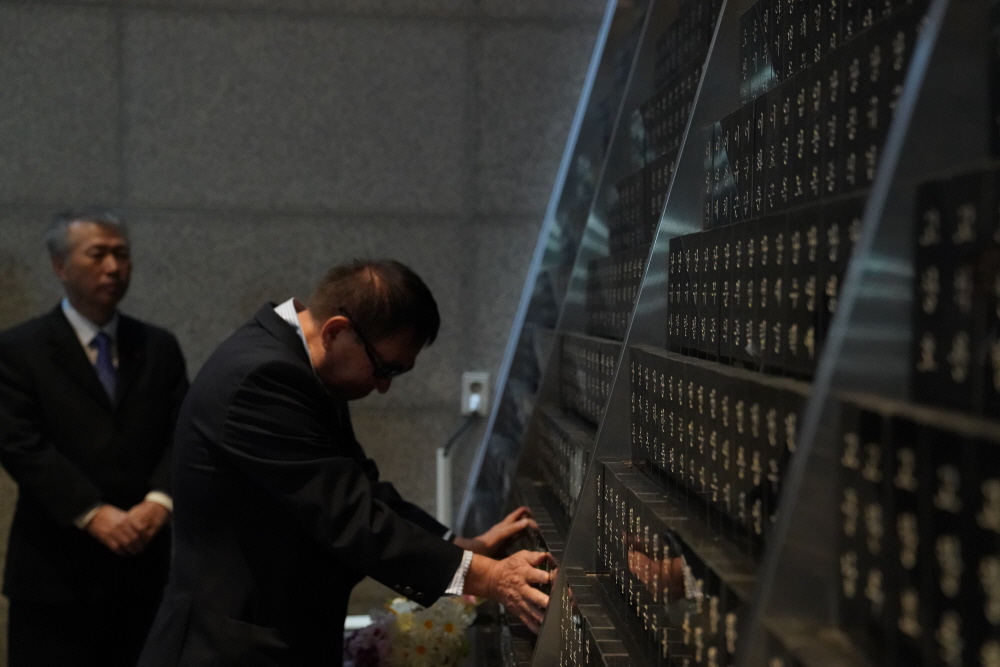 Chairperson Lee Han-jin, a survivor of 4·3 from Hwabuk, found the names of family members whom he lost to 4·3 in the Memorial Tablets Enshrinement Room, and his reddened eyes filled with tears, which moved everyone. Though the nationality, age and location of the participants were all different, they ended the forum motivated to promote the truth of Jeju 4·3.
Chairperson Lee Han-jin, a survivor of 4·3 from Hwabuk, found the names of family members whom he lost to 4·3 in the Memorial Tablets Enshrinement Room, and his reddened eyes filled with tears, which moved everyone. Though the nationality, age and location of the participants were all different, they ended the forum motivated to promote the truth of Jeju 4·3.